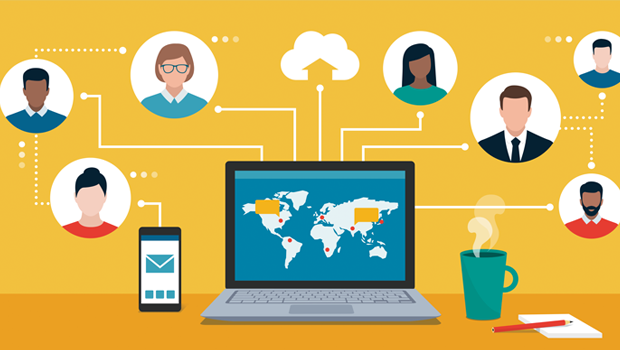Future of Remote Work: Is the Office Dead?
The COVID-19 pandemic changed the way we work forever. What started as a global health crisis quickly turned into a massive remote work experiment for the future, forcing businesses worldwide to adapt to a distributed workforce almost overnight. Now, more than two years later, the future of remote work models is firmly established—and many organizations have redefined the way work gets done.
This shift raises an important and timely question: Is the office dead?

The Rise of Future of Remote Work
Before 2020, remote work was the exception rather than the rule. Despite the availability of digital tools, most companies preferred traditional office setups due to concerns about productivity, collaboration, and maintaining company culture.
However, when the pandemic hit, remote work became a necessity. Companies that once resisted it were forced to adapt, and surprisingly, many found that productivity levels remained steady—or even improved. At the same time, employees reported benefits like better work-life balance, reduced commuting stress, and greater flexibility.
What was once seen as a temporary fix quickly began to feel like the future of work.

Key Benefits Future of Remote Work Adoption
Several ongoing advantages continue to fuel the rise of remote work in 2025 and beyond:
1. Access to a Global Talent Pool
Remote work removes geographical barriers to hiring. Companies can now tap into talent worldwide, enabling them to recruit the best candidates regardless of location.
2. Cost Savings for Businesses
Organizations can significantly reduce operating costs—such as office rent, utilities, and in-office perks—by downsizing physical spaces or going fully remote.
3. Improved Employee Satisfaction
Flexibility is a top priority for modern workers. Remote employees consistently report higher job satisfaction, lower stress levels, and greater autonomy.
4. Environmental Sustainability
Remote work contributes to a smaller carbon footprint by reducing commuting and office-related energy consumption—key benefits for environmentally conscious companies.
The Case for the Traditional Office
Despite the clear advantages of remote work, declaring the death of the office may be premature. Physical office spaces still offer unique value, particularly for certain roles and situations.
1. Enhanced Collaboration and Innovation
Face-to-face interactions foster creativity and spontaneous problem-solving. Watercooler conversations and brainstorming sessions often lead to innovative ideas that are harder to replicate virtually.
2. Stronger Company Culture
In-person work environments help build relationships, reinforce company values, and boost employee engagement—especially important for onboarding new team members.
3. Hands-On Training and Mentorship
Junior employees and recent graduates often benefit from in-person mentorship and learning by observation, which can be difficult to achieve in a fully remote setting.
4. Risk of Employee Burnout
Without clear boundaries between work and personal life, remote employees can experience burnout. The lack of separation between home and office makes it harder to “switch off.”
The Rise of Hybrid Work Models
To strike a balance between flexibility and collaboration, many organizations have adopted hybrid work models. These allow employees to split their time between working from home and the office, providing the best of both worlds.
Notable Examples:
-
Google, Microsoft, and Apple offer hybrid work schedules, allowing teams to decide how and where they work best.
-
Companies like Twitter and Shopify have gone fully remote, closing offices or repurposing them as optional coworking spaces.

Challenges of Hybrid Work
Despite its benefits, hybrid work presents unique challenges:
-
Scheduling Coordination: Aligning in-office days can be complicated.
-
Inclusion & Equity: Fully remote employees may feel left out of key meetings or social interactions.
-
Technology Needs: Businesses must invest in tools and platforms that support seamless collaboration across locations.
Technology Is Powering the Future of Remote Work Revolution
None of this transformation would be possible without the rapid advancement of digital tools. Platforms like Zoom, Slack, Microsoft Teams, Asana, and Notion have become staples of the modern workplace.
Future Innovations to Watch:
-
Virtual Reality (VR) Workspaces: Immersive virtual offices may soon replicate the social and creative dynamics of physical offices.
-
AI-Powered Tools: Artificial intelligence will continue to optimize workflows, automate repetitive tasks, and provide real-time support.
-
Remote Onboarding & Training Solutions: Digital learning platforms are becoming more interactive, making it easier to train and integrate new hires remotely.
The Future of Remote Work: Flexibility as the New Normal
The most significant takeaway from the remote work evolution is that flexibility is here to stay. While some companies may return to traditional office settings, a complete reversal is highly unlikely.
Emerging Work Trends:
-
Outcome-Based Performance Metrics: Employers are shifting from hours-based tracking to goal-oriented evaluations.
-
Asynchronous Workflows: Distributed teams are using asynchronous communication to collaborate across time zones.
-
Work-from-Anywhere Policies: Countries offering “digital nomad visas” and coworking hubs are attracting remote professionals.
-
Redesigned Office Spaces: Offices are being reimagined as collaboration hubs rather than rows of individual desks.
Is the Office Really Dead?
So, is the traditional office dead in 2025?
Not entirely—but its role has fundamentally changed.
Rather than serving as the default location for work, the office is becoming just one of many options. It’s evolving into a place for intentional collaboration, creativity, and relationship-building—not daily attendance.
Organizations that embrace remote-first or hybrid approaches, support digital infrastructure, and trust employees to manage their time will be best positioned for long-term success.
Companies that resist this shift risk falling behind in the war for talent and innovation.
Final Thoughts: A New Definition Future of Remote Work
The real question isn’t whether remote work is better than office work. Instead, it’s about acknowledging that different roles, teams, and individuals have different needs.
The future of work is not black and white. It’s flexible, hybrid, digital, and human-centered. In this evolving landscape, work is no longer defined by where you are—but by what you do.
The office isn’t dead—but it’s no longer the only place that matters.